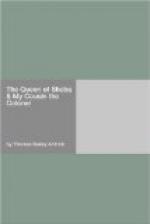On Wednesday morning when Mr. Bowlsby came down to the bank he was slightly surprised at seeing the young cashier at his accustomed desk. To Mr. Bowlsby’s brief interrogations then, and to Miss Mildred Bowlsby’s more categorical questions in the evening, Lynde offered no very lucid reason for curtailing his vacation. Travelling alone had not been as pleasant as he anticipated; the horse was a nuisance to look after; and then the country taverns were snuffy and unendurable. As to where he had been and what he had seen—he must have seen something and been somewhere in eight days—his answers were so evasive that Miss Mildred was positive something distractingly romantic had befallen the young man.
“If you must know,” he said, one evening, “I will tell you where I went.”
“Tell me, then!”
“I went to Constantinople.”
Miss Mildred found that nearly impertinent.
There was, too, an alteration in Lynde’s manner which cruelly helped to pique her curiosity. His frank, half satirical, but wholly amiable way— an armor that had hitherto rendered him invulnerable to Miss Mildred’s coquettish shafts—was wanting; he was less ready to laugh than formerly, and sometimes in the midst of company he fell into absent-minded moods. Instead of being the instigator and leader of picnics up the river, he frequently pleaded bank duties as an excuse for not joining such parties. “He is not at all as nice as he used to be,” was Miss Mildred’s mental summing up of Lynde a fortnight after his return.
He was, in fact, unaccountably depressed by his adventure in the hill country; he could not get it out of his mind. The recollection of details which he had not especially remarked at the time came to him in the midst of his work at the bank. Sometimes when he turned off the gas at night, or just as he was falling asleep, the sharp, attenuated figure of the ship-builder limned itself against the blackness of the chamber, or the old gentleman’s vacuous countenance in its frame of silver hair peered in through the hangings of the bed. But more frequently it was the young girl’s face that haunted Lynde. He saw her as she came up the sunny road, swinging the flower in her hand, and looking like one of Fra Angelico’s seraphs or some saint out of an illuminated mediaeval missal; then he saw her seated on the horse, helpless and piteous with the rude, staring men about her. If he dreamed, it was of her drawing herself up haughtily and saying, “I am the Queen of Sheba.” On two or three nights, when he had not been dreaming, he was startled out of his slumber by a voice whispering close to his ear: “I know you, too, very well. You are my husband.”
Mr. Bowlsby and his daughter were the only persons in Rivermouth to whom Lynde could have told the story of his journey. He decided not to confide it to either, since he felt it would be vain to attempt to explain the sombre effect which the whole affair had had on him.




